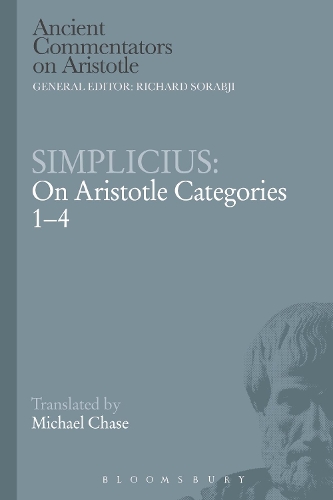
Simplicius: On Aristotle Categories 1-4
(Paperback)
Available Formats
Hardback
Published: 27th January 2011
Hardback
Published: 24th February 2011
Hardback
Published: 1st November 2011
Paperback
Published: 26th March 2014
Paperback
Published: 26th March 2014
Paperback
Published: 26th March 2014
Paperback
Published: 26th March 2014
Paperback
Published: 26th March 2014
Paperback
Published: 26th March 2014
Paperback
Published: 26th March 2014
Paperback
Published: 26th March 2014
Paperback
Published: 26th March 2014
Paperback
Published: 26th March 2014
Publishing Details
Simplicius: On Aristotle Categories 1-4
By (Author) Simplicius
Translated by Dr Michael Chase
Bloomsbury Publishing PLC
Bloomsbury Academic
26th March 2014
United Kingdom
Classifications
Tertiary Education
Non Fiction
Ancient Greek and Roman philosophy
160
Physical Properties
Paperback
256
Width 156mm, Height 234mm
290g
Description
Simplicius' commentary on Aristotle's Categories is the most comprehensive philosophical critique of the work ever written, representing 600 years of criticism. In his Categories, Aristotle divides what exists in the sensible world into ten categories of Substance, Quantity, Relative, Quality and so on. Simplicius starts with a survey of previous commentators, and an introductory set of questions about Aristotle's philosophy and about the Categories in particular. The commentator, he says, needs to present Plato and Aristotle as in harmony on most things. Why are precisely ten categories named, given that Plato did with fewer distinctions We have a survey of views on this. And where in the scheme of categories would one fit a quality that defines a substance - under substance or under quality In his own commentary, Porphyry suggested classifying a defining quality as something distinct, a substantial quality, but others objected that this would constitute an eleventh. The most persistent question dealt with here is whether the categories classify words, concepts, or things.
Author Bio
Dr Michael Chase is Assistant Editor at L'Annee Philologique and Research Engineer at the National Centre of Scientific Research, Paris, France.
